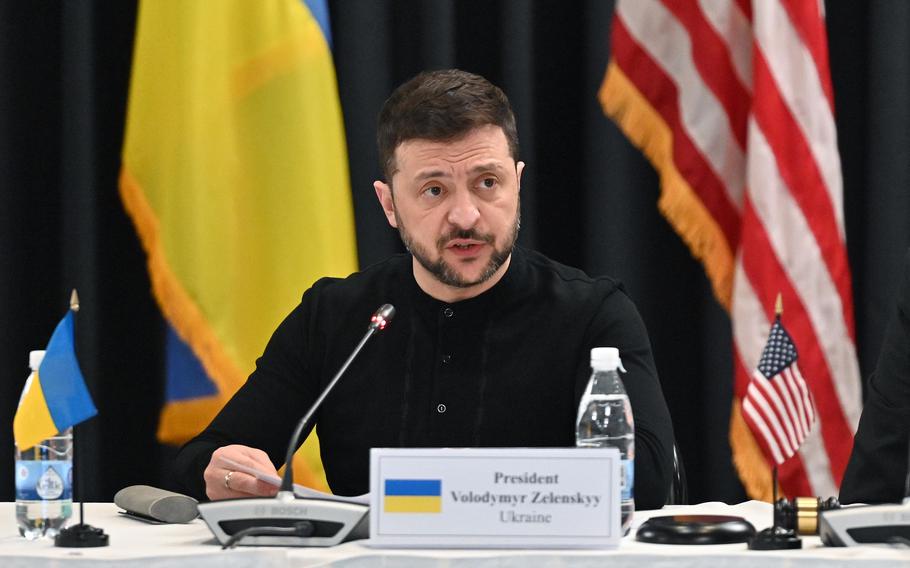
Ukrainian President Volodymyr Zelenskyy makes his opening remarks at the Ukraine Defense Contact Group meeting, Jan. 9, 2025, at Ramstein Air Base, Germany. Zelenskyy, addressing global leaders at a security conference in Munich, warned his European counterparts that Russia is building up a military capable of striking out beyond Ukraine. (Michael Abrams/Stars and Stripes)
MUNICH, Germany — The United States can no longer be relied on to ensure security in Europe, which is at risk of being pulled apart by Russia without a continent-wide military force of its own, Ukrainian President Volodymyr Zelenskyy said Saturday.
Zelenskyy, addressing global leaders at a security conference in Munich, warned his European counterparts that Russia is building up a military capable of striking out beyond Ukraine.
“Maybe it’s meant for you,” Zelenskyy said.
The Ukrainian leader said in a wide-ranging speech that the Trump administration was sidelining European countries as Washington pursues a peace deal with Russian President Vladimir Putin.
As he entered the Bayerischer Hof hotel in Munich, Zelenskyy was greeted with a rousing standing ovation. And at the end of his nearly 30-minute talk the crowd rose to their feet again.
Zelenskyy’s call for European unity in the face of Russian aggression came one day after Vice President JD Vance excoriated Europe in a speech that suggested allies were backsliding on democracy and free speech. Leaders, including those in Germany, pushed back on Vance, saying he was out of line.
“That is not done, certainly not among friends and allies,” German Chancellor Olaf Scholz said Saturday. “Where our democracy goes from here is for us to decide.”
Zelenskyy said Vance made clear that “the old relationship between Europe and America” was ending.
“From now on, things will be different, and Europe needs to adjust to that,” Zelenskyy said.
He said it is possible that the United States won’t come to Europe’s defense if attacked.
“An army of Europe, I really believe that time has come. The Armed Forces of Europe must be created,” he said.
Such ideas have been floated in the past in Europe but have never taken hold.
However, tensions are increasing between Europe and the United States. Allies are unsure about how involved the U.S. military will be in Europe going forward given the Pentagon’s increased focus on countering China in the Pacific. And there is angst over Trump’s recent phone call with Putin about the course of the war in Ukraine and how to bring it to an end.
European leaders and Zelenskyy have demanded a seat at the negotiating table but it’s not yet clear how the structure of discussions would play out.
Retired Lt. Gen. Keith Kellogg, Trump’s special envoy to Ukraine and Russia, said Saturday that Europe should put forward proposals for potential peace deals.
But while European concerns would factor into talks, Kellogg said he did not anticipate Europeans having a literal seat at the table. “What we don’t want to do is get into a large group discussion,” he said.
In a recent conversation with Trump, Zelenskyy said the American president briefed him on his call with Putin. Trump never once mentioned that he wanted Europe at the table, Zelenskyy said.
Characterizing the United States as unreliable, Zelenskyy said Europeans should band together in a way that puts Europe first.
“Everything needed to protect lives in modern war should be produced in Europe. Fully. Europe has everything it takes,” he said.
Otherwise, the Continent will be vulnerable, Zelenskyy said.
“Moscow will pull Europe apart if we as Europeans don’t trust each other,” Zelenskyy said. “The old days are over when America supported Europe just because it always had.”
Sen. Lindsey Graham, R-S.C., said Europeans should recognize that Trump is well-positioned to bring about a strong peace agreement, noting that past instances of Russian aggression in Europe happened when others occupied the White House.
“Trump is the best person I know of to get it right because Putin is afraid of him,” said Graham, speaking in Munich on Saturday.
Graham highlighted Russia’s 2008 invasion of Georgia, its initial 2014 attack in Ukraine and subsequent 2022 full-scale invasion as being brought on by past administrations fearful of provoking Putin.
One idea Graham has been pushing in Munich is that while NATO membership for Ukraine is unlikely as part of any peace deal now, it should be put on the table that Kyiv’s entrance into the alliance would be automatic should Russia invade again.
“If President Trump said that, it would be earth shattering,” Graham said.
In Munich, allies talked about putting more urgency into efforts to enhance their own defenses. Increased defense spending is a top priority for Trump, who has made that his primary concern in his dealings with NATO.
Trump has said allies need to increase their minimum investments in defense from 2% of gross domestic product to 5%. Some allies are already headed in that direction, including Poland and the Baltic states.
However, Germany has so far balked at going up to 5%.
Scholz said Berlin will need to reform its budgeting rules to boost defense spending beyond its current levels. In Germany, there is a so-called “debt brake” that is an obstacle to increased spending without making big cuts in other areas or tax increases.
Scholz said he would support reforms to exempt defense spending from the debt brake in the near-term, and possibly for the long-term.